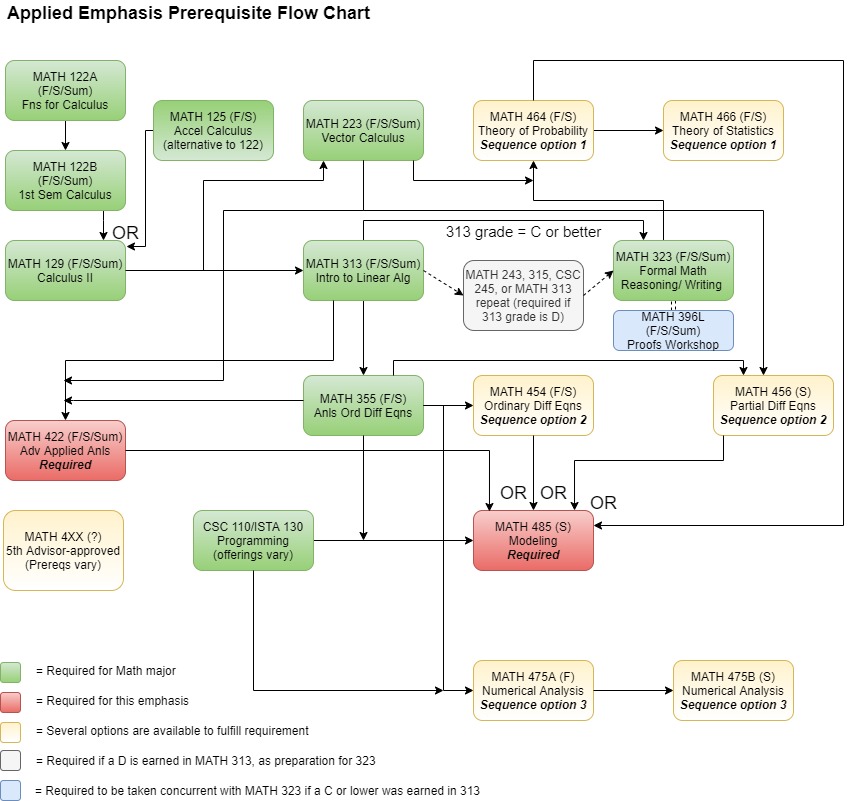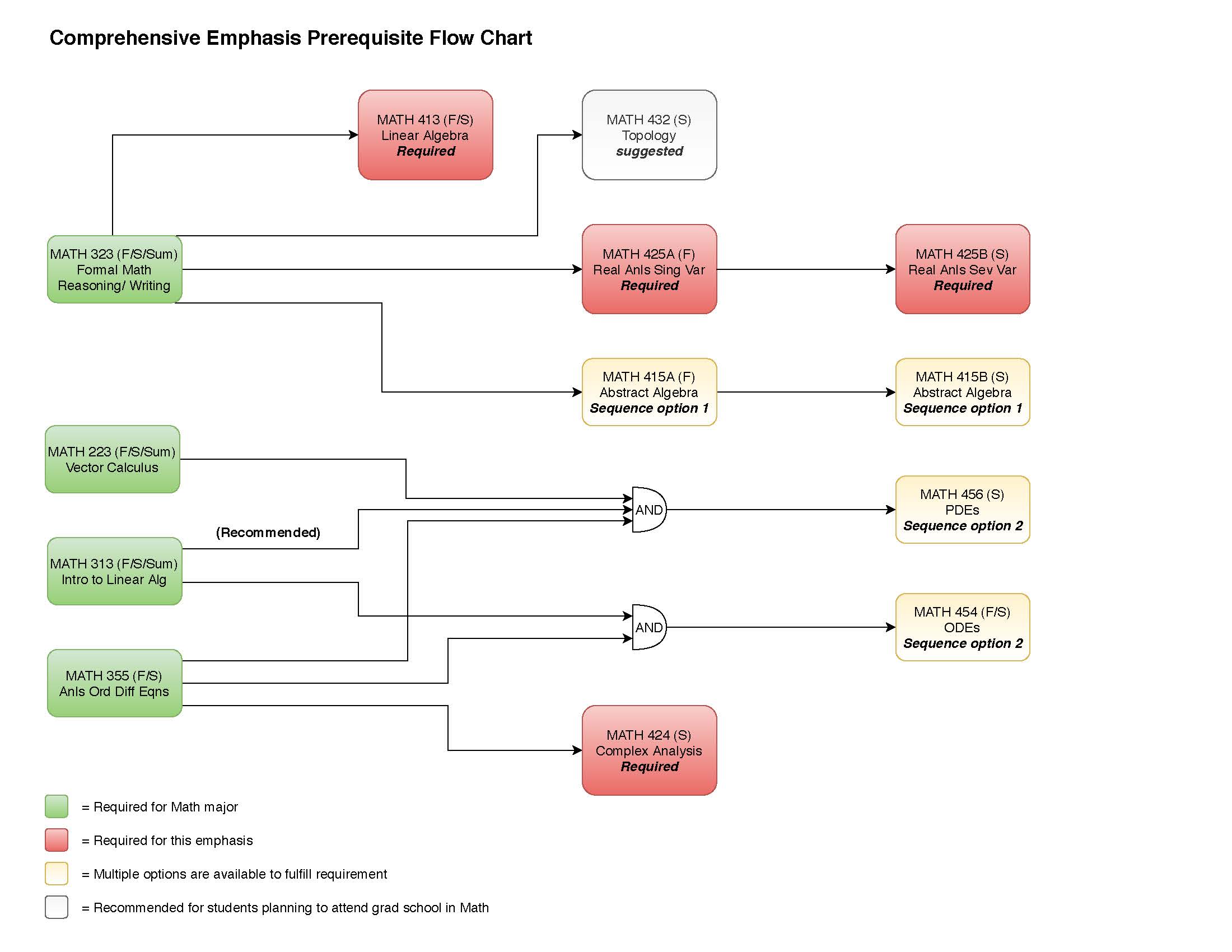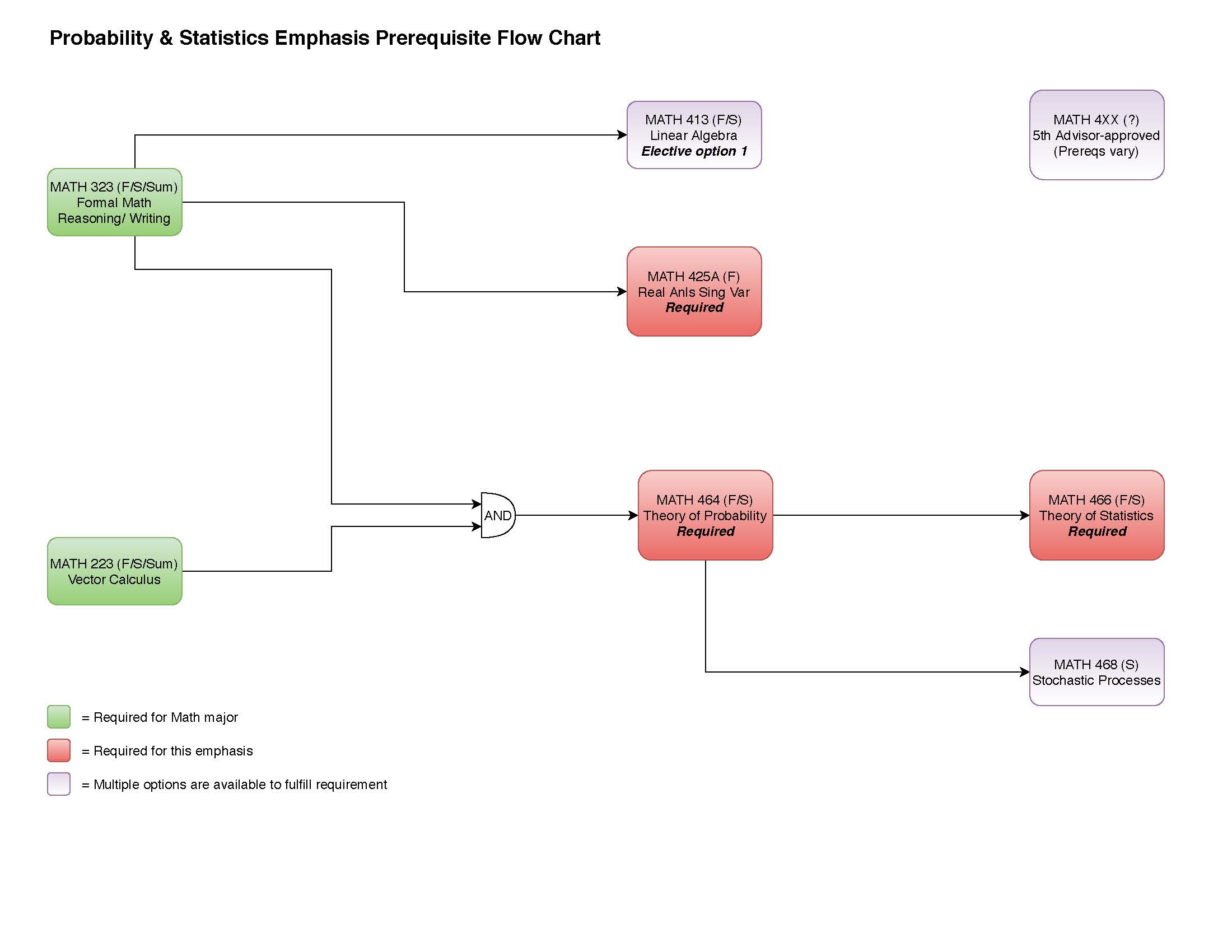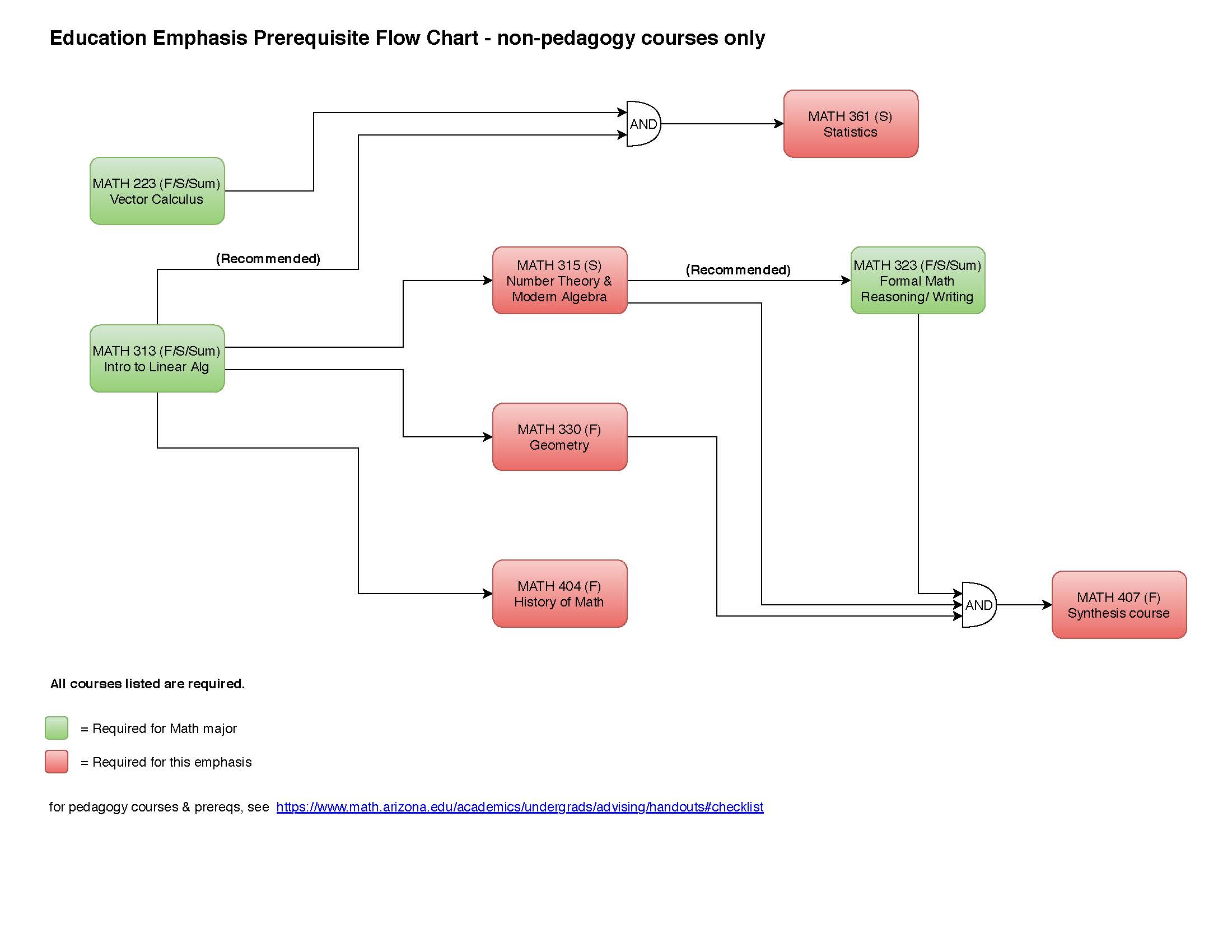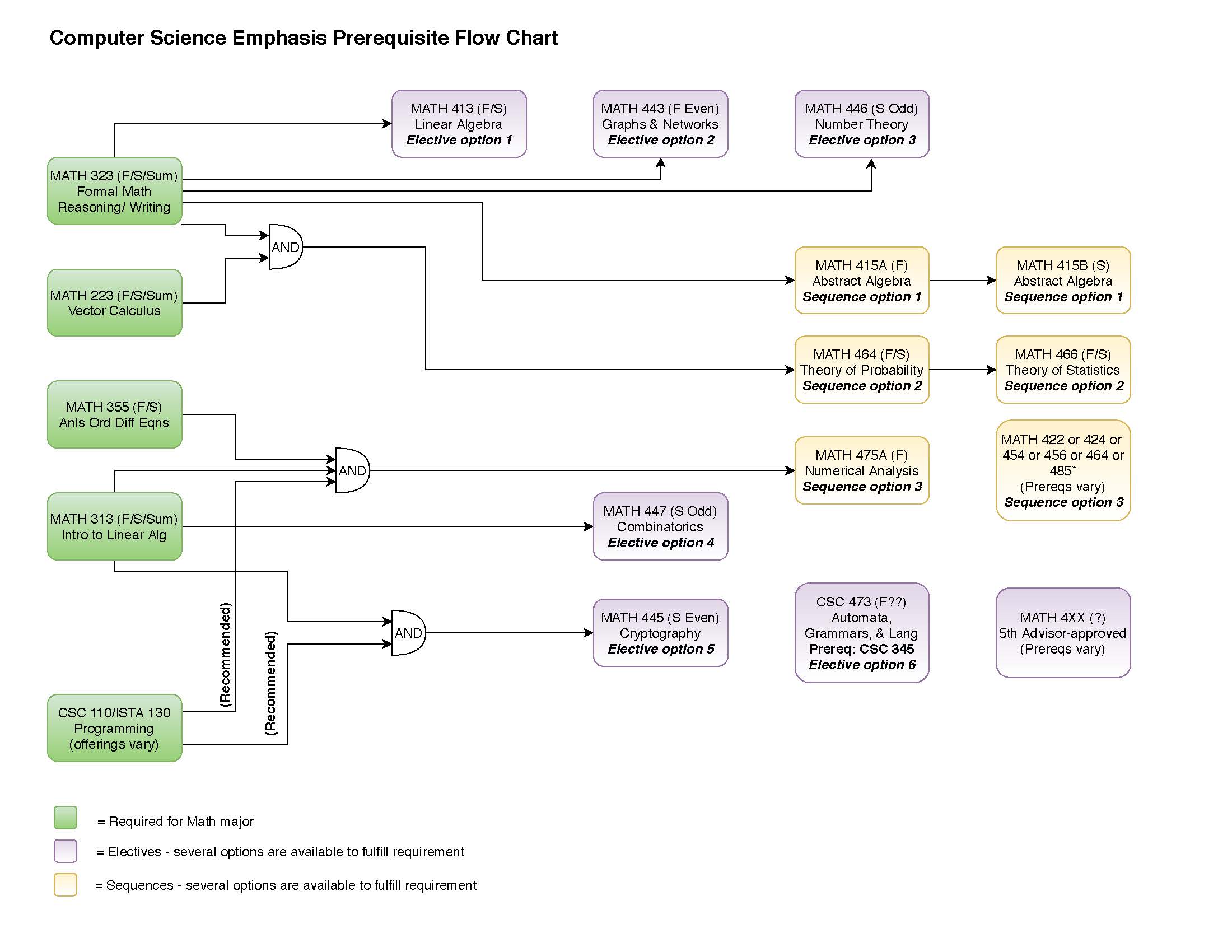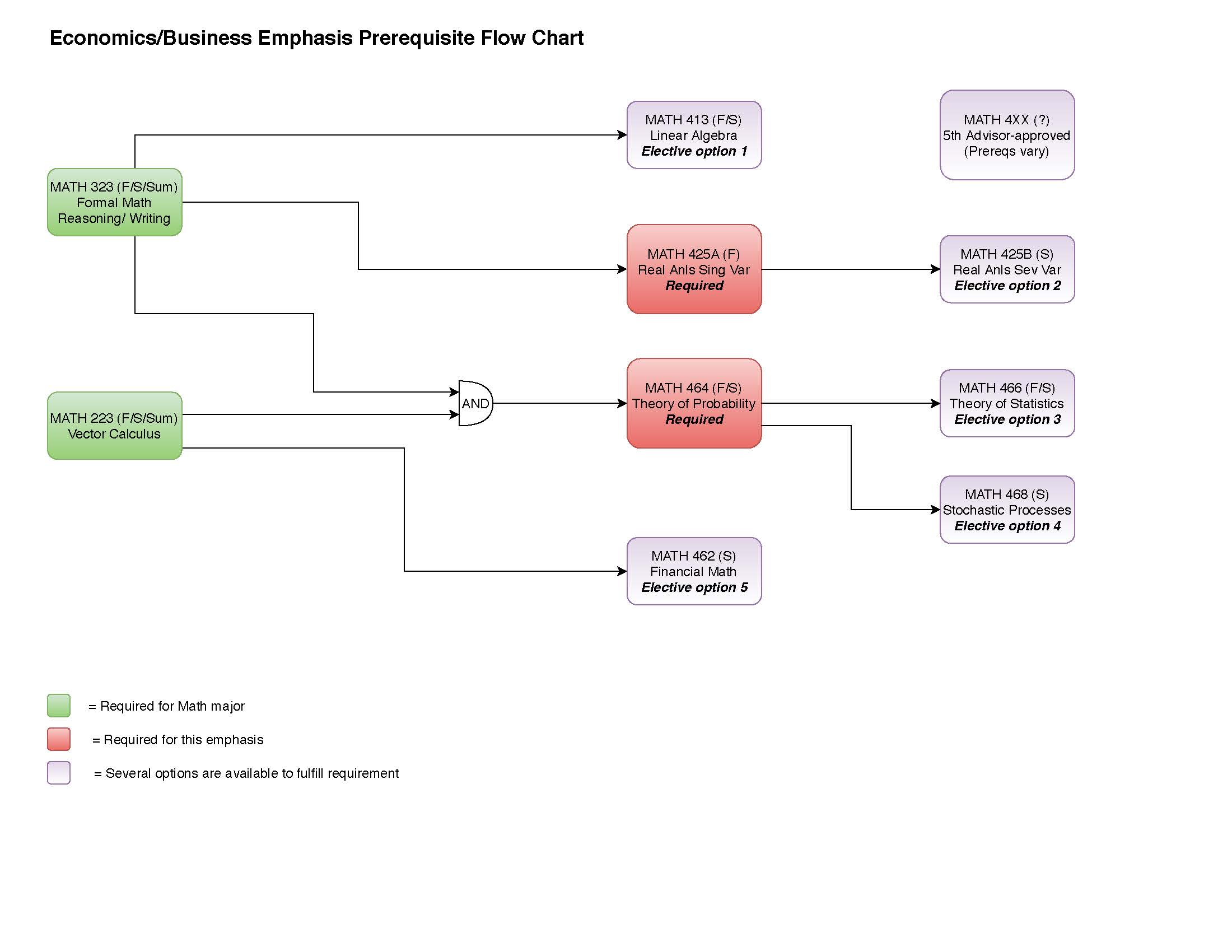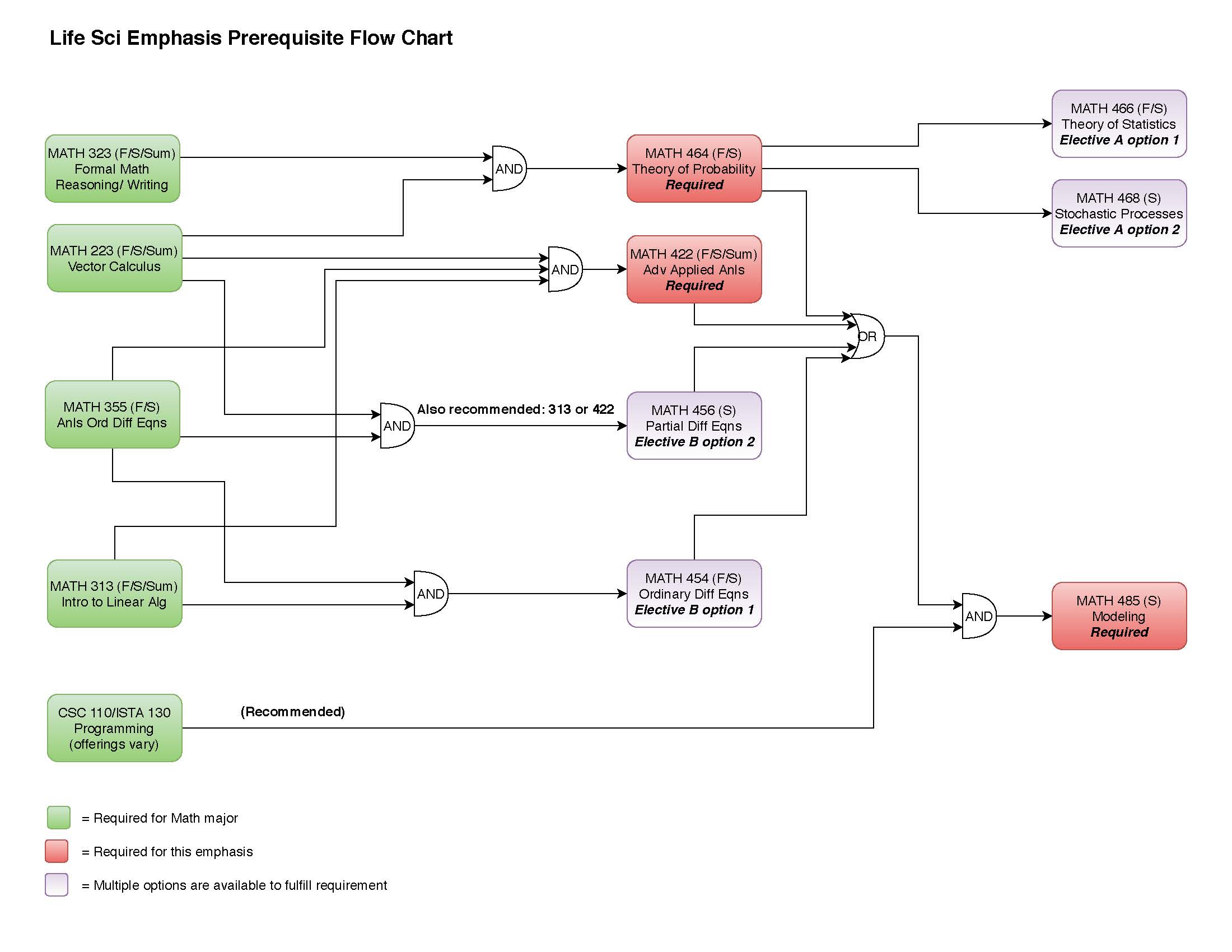Math Major Course Requirements and Emphases 2019
Overview
Both the Bachelor of Arts (B.A.) and the Bachelor of Science (B.S.) in Mathematics require a core of basic courses followed by additional courses specific to one of seven possible emphases:
- Applied Mathematics emphasis: This emphasis is for students who intend to enter the job market upon graduation, but may also be appropriate for students who plan to go on to graduate school in a field of science or engineering.
- Comprehensive emphasis: This emphasis prepares students for graduate study in mathematics, applied mathematics, or most other scientific fields.
- Probability and Statistics emphasis: This emphasis is for students considering a career as an actuary or statistician, as well as for students wanting to attend graduate school in statistics.
- Mathematics Education emphasis: This emphasis prepares students for teaching mathematics at the secondary school level. The emphasis has two main components: a set of courses in mathematics, and a set of courses in teaching and learning mathematics in secondary schools.
- Computer Science emphasis: This emphasis is for students interested in applications of computers to mathematical problems, including math majors who plan to attend graduate school in computer science.
- Economics or Business emphasis: This emphasis is for students with a particular interest in business applications of mathematics, especially those preparing for graduate school in economics or finance.
- Life Sciences emphasis: This emphasis is for students considering a career in medicine, as well as for students wanting to attend graduate school in the biological sciences.
Each emphasis requires at least 15 units of 400-level mathematics course work, and each emphasis, except Mathematics Education, requires the student to complete a minor outside the math department. Courses in minors must be distinct from those in the major.
The complete official requirements for each emphasis are given in the University Catalog in the form of an Academic Advisement Report (ADVIP). Below we cover the portion of the requirements specific to the mathematics major. It is important for students to consult with their academic advisor about their choice and order of courses, as well as which additional courses would strengthen their degree program.
The information and requirements given here apply to the 2019–2020 catalog. For other catalog years, please consult the archive.
Supporting Computer Science Requirement
All math and SDS majors are required to complete a computer programming course, regardless of the degree and emphasis selected. Choose one course:(2)
- CSC 110 — Introduction to Computer Programming I
- ISTA 130 — Computational Thinking and Doing
Core Courses
All seven emphases for the B.A./B.S. require the following core courses, which should ideally be completed by the end of the sophomore year.
- MATH 122A AND MATH 122B (2) or MATH 125 — Calculus I
- MATH 129 — Calculus II
- MATH 223 — Vector Calculus
- MATH 313 — Introduction to Linear Algebra (3)
- MATH 323 — Formal Mathematical Reasoning and Writing (4)
- MATH 355 — Analysis of Ordinary Differential Equations (5)
(1)Either CSC 110 or ISTA 130 is recommended for most students. Other courses that can be used to satisfy the programming requirement are: CSC 120, CSC 127A, CSC 227, ECE 175, MIS 301, and PHYS 305. These latter courses may require prior programming experience, additional prerequisites and/or a major or minor declared in another subject.
(2)MATH 122A and MATH 122B are a single-semester sequence of courses that cover Calculus I. They are equivalent to the old MATH 124 course, which is no longer offered.
(3) MATH 313 replaces MATH 215, which is no longer offered. Students who completed MATH 215 prior to fall 2015 or who have transfer credit equivalent to MATH 215 will still fulfill this requirement, though they will not earn upper-division credit for the course.
(4)MATH 323 is a writing-emphasis course that is the foundation for many of the advanced courses taken by math majors. It is prerequisite for more theoretical 400-level courses in the major. Students who do not do well in MATH 323 should speak to an advisor about their choice of major/emphasis. MATH 396L, the Wildcat Proofs Workshop, is a 1 unit supplemental instruction course intended to give students additional practice and guidance in learning proof writing techniques. The course is optional, but recommended!
(5)MATH 355 is the differential equations course that all mathematics majors are expected to take. This course emphasizes the ideas of dynamical systems and makes use of a more sophisticated approach to differential equations. MATH 254 is a differential equations course that is aimed at engineering and science majors. Students with an additional major in engineering or science may ask their math faculty advisors for permission to substitute MATH 254 course for MATH 355 if a scheduling issue arises.
Applied Mathematics emphasis
The information and requirements given here apply to the 2019–2020 catalog. For other catalog years, please consult the archive.
The Academic Advising Report (ADVIP) gives complete degree requirements:
A minor in any subject outside the math department is required with this emphasis.
Major requirements:
- Core Courses
- MATH 422— Advanced Applied Analysis
- One of the following three sequences:
- MATH 454— Ordinary Differential Equations and Stability Theory
- MATH 456— Applied Partial Differential Equations
- MATH 464— Theory of Probability
- MATH 466— Theory of Statistics
- MATH 475A— Mathematical Principles of Numerical Analysis
- MATH 475B— Mathematical Principles of Numerical Analysis
- MATH 485— Mathematical Modeling (*)
- A 5th 400-level MATH course, to be selected with approval from your math faculty advisor. You may choose from the pre-approved list: MATH 413, MATH 424, MATH 454, MATH 456, MATH 464, MATH 468, MATH 475A, MATH 488. If you prefer to select another course, you may do so ONLY if approved by your math faculty advisor.
(*) Students should plan to take MATH 485 in their final spring semester (it is only offered in spring semesters). In addition to more typical prerequisites, MATH 485 requires completion of at least one 400-level MATH course (422, 454, 456, 464, or 475A). Prerequisites also include linear algebra (313), differential equations (254 or 355), and a programming course.
For an example of how to order your coursework to heed prerequisites and meet all degree requirements, please consult the sample 4-year plans. You will develop an individualized plan in consultation with your faculty advisor. Students planning to enroll in three MATH courses in a single semester are advised to talk to their math faculty advisor before finalizing their schedule. The Math Department requires that students enrolling in four or more MATH courses for a single term obtain permission from their math faculty advisor. Note that special courses like Supplemental Instruction, Workshops, Teaching Assistantship enrollment, and Pedagogy courses for the Secondary Math Education Program are not counted toward this limit.
Comprehensive emphasis
The information and requirements given here apply to the 2019–2020 catalog. For other catalog years, please consult the archive.
The Academic Advising Report (ADVIP) gives complete degree requirements:
This emphasis covers the minimum requirements for admission to most graduate programs in mathematics or applied mathematics. We have separate information on selecting the appropriate emphasis and courses to prepare for various types of graduate programs. Students selecting the comprehensive emphasis should consult with a Mathematics Department faculty advisor in choosing additional course work to ensure that they are prepared for the graduate school of their choice. A minor in any subject outside the math department is required with this emphasis.
Major requirements:
- Core Courses
- MATH 413— Linear Algebra
- MATH 424— Theory of Complex Variables
- MATH 425A— Real Analysis of One Variable
- MATH 425B— Real Analysis of Several Variables
- One of the following two pairs:
- MATH 415A— Introduction to Abstract Algebra
- MATH 415B— Second Course in Abstract Algebra
- MATH 454— Ordinary Differential Equations and Stability Theory
- MATH 456— Applied Partial Differential Equations
Students completing this emphasis are expected to be proficient in proof writing before beginning most of the 400-level courses above. It is recommended that students who do not earn an A or B in MATH 323 speak with an advisor about their selected math major emphasis before enrolling in proof-intensive 400-level courses.
For an example of how to order your coursework to heed prerequisites and meet all degree requirements, please consult the sample 4-year plans. You will develop an individualized plan in consultation with your faculty advisor. Students planning to enroll in three MATH courses in a single semester are advised to talk to their math faculty advisor before finalizing their schedule. The Math Department requires that students enrolling in four or more MATH courses for a single term obtain permission from their math faculty advisor. Note that special courses like Supplemental Instruction, Workshops, Teaching Assistantship enrollment, and Pedagogy courses for the Secondary Math Education Program are not counted toward this limit.
Probability and Statistics emphasis
The information and requirements given here apply to the 2019–2020 catalog. For other catalog years, please consult the archive.
The Academic Advising Report (ADVIP) gives complete degree requirements:
A minor in any subject outside the math department is required with this emphasis. The math major with probability and statistics emphasis differs from the Statistics and Data Science (SDS) major in that it gives more theoretical background. Students who wish to attend graduate school in statistics, economics, or another related field are advised to choose this option instead of (or in addition to) the SDS major. In association with the Graduate Interdisciplinary Program in Statistics, we offer an Accelerated Master's Program in Statistics.
Major requirements:
- Core Courses
- MATH 425A— Real Analysis of One Variable
- MATH 464— Theory of Probability
- MATH 466— Theory of Statistics
- One of the following two courses:
- MATH 468— Applied Stochastic Processes
- MATH 413— Linear Algebra
- A 5th 400-level MATH course, to be selected with approval from your math faculty advisor. You may choose from the pre-approved list: MATH 413, MATH 422, MATH 425B, MATH 454, MATH 456, MATH 462, MATH 468, MATH 485. If you prefer to select another course, you may do so ONLY if approved by your math faculty advisor.
Students completing this emphasis are expected to be proficient in proof writing before beginning their 400-level course work. It is recommended that students who do not earn an A or B in MATH 323 speak with an advisor about their selected math major emphasis before enrolling in 400-level courses.
For an example of how to order your coursework to heed prerequisites and meet all degree requirements, please consult the sample 4-year plans. You will develop an individualized plan in consultation with your faculty advisor. Students planning to enroll in three MATH courses in a single semester are advised to talk to their math faculty advisor before finalizing their schedule. The Math Department requires that students enrolling in four or more MATH courses for a single term obtain permission from their math faculty advisor. Note that special courses like Supplemental Instruction, Workshops, Teaching Assistantship enrollment, and Pedagogy courses for the Secondary Math Education Program are not counted toward this limit.
Mathematics Education emphasis
The information and requirements given here apply to the 2019–2020 catalog. For other catalog years, please consult the archive.
The Academic Advising Report (ADVIP) gives complete degree requirements:
This emphasis is for students preparing to teach mathematics at the secondary school level. The Education emphasis has two main components, a set of courses in mathematics, and a set of pedagogy courses. This emphasis does not require a minor. See the Secondary Math Education Program (SMEP) website for additional information.
The Noyce Interns and Noyce Scholars programs offer experience to students interested in learning more about the teaching profession; see the SMEP website for details and to apply.
Major requirements:
- Core Courses
- Courses in Mathematics:
- MATH 315— Introduction to Number Theory and Modern Algebra
- MATH 330— Topics in Geometry
- MATH 361— Elements of Statistics Using Calculus
- MATH 404— History of Mathematics
- MATH 407— Synthesis of Mathematical Concepts
- Courses in Teaching and Learning Mathematics (Pedagogy):
- MATH 205— Teaching Secondary Mathematics
- EDP 301— Educational Psychology and Child and Adolescent Development
- SERP 400— Survey of Exceptional Students
- One SEI course, either
- LCEV 408— Methods of Teaching English to English Language Learners OR
- TLS 416— An Introduction to Structured English Immersion
- TLS 435— Content Area Literacy in a Multicultural School
- MATH 406A— Curriculum and Assessment in Secondary School Mathematics
- MATH 406B— Methods of Teaching Mathematics in Secondary Schools
- MATH 494C— Student Teaching
- Constitution Requirement for Arizona State certification.
- This requirement is fulfilled by completing one of the following: POL 210 or equivalent; a passing score on the Arizona and US Constitution exams.
- GPA requirements:
- GPA ≥ 2.5 in MATH 122A&B/125, 129, 223
- Pedagogy GPA ≥ 2.5
- Major GPA ≥ 2.0
- Cumulative UA GPA ≥ 2.0
For an example of how to order your coursework to heed prerequisites and meet all degree requirements, please consult the sample 4-year plans. You will develop an individualized plan in consultation with your faculty advisor. Students planning to enroll in three MATH courses in a single semester are advised to talk to their math faculty advisor before finalizing their schedule. The Math Department requires that students enrolling in four or more MATH courses for a single term obtain permission from their math faculty advisor. Note that special courses like Supplemental Instruction, Workshops, Teaching Assistantship enrollment, and Pedagogy courses for the Secondary Math Education Program are not counted toward this limit.
Computer Science emphasis
The information and requirements given here apply to the 2019–2020 catalog. For other catalog years, please consult the archive.
The Academic Advising Report (ADVIP) gives complete degree requirements:
A minor in computer science is required with this emphasis.
Major requirements:
- Core Courses
- One of the following three sequences:
- MATH 415A— Introduction to Abstract Algebra
- MATH 415B— Second Course in Abstract Algebra
- MATH 464— Theory of Probability
- MATH 466— Theory of Statistics
- MATH 475A— Mathematical Principles of Numerical Analysis
- MATH 475B— Mathematical Principles of Numerical Analysis
- Two of the following six courses:
- MATH 413— Linear Algebra
- MATH 443— Theory of Graphs and Networks
- MATH 445— Introduction to Cryptography
- MATH 446— Theory of Numbers
- MATH 447— Combinatorial Mathematics
- CSC 473— Automata, Grammars and Languages (*)
- A 5th 400-level MATH course, to be selected with approval from your math faculty advisor. You may choose from the pre-approved list: MATH 401A, MATH 401B, MATH 402, MATH 413, MATH 415A, MATH 443, MATH 445, MATH 446, MATH 447, MATH 464, MATH 468, MATH 475A, MATH 485, or CSC 473. If you prefer to select another course, you may do so ONLY if approved by your math faculty advisor.
(*) Students minoring in Computer Science may not double-dip courses with their math major. Students with a double major in Computer Science and Mathematics may be able to double-dip additional courses between the two majors, within reasonable limits. It is important to consult with advisors from both majors when planning your coursework to avoid graduation delays.
For an example of how to order your coursework to heed prerequisites and meet all degree requirements, please consult the sample 4-year plans. You will develop an individualized plan in consultation with your faculty advisor. Students planning to enroll in three MATH courses in a single semester are advised to talk to their math faculty advisor before finalizing their schedule. The Math Department requires that students enrolling in four or more MATH courses for a single term obtain permission from their math faculty advisor. Note that special courses like Supplemental Instruction, Workshops, Teaching Assistantship enrollment, and Pedagogy courses for the Secondary Math Education Program are not counted toward this limit.
Economics or Business emphasis
The information and requirements given here apply to the 2019–2020 catalog. For other catalog years, please consult the archive.
The Academic Advising Report (ADVIP) gives complete degree requirements:
This emphasis requires either
- an Economics Minor, or
- a Business Administration Minor, or
- a Finance Minor, or
- a Thematic Minor emphasizing courses from two or more disciplines/subject areas such as Economics, Business, and Finance, or
- a second major in one of the above or in Personal and Family Financial Planning.
The minor should be chosen in consultation with an advisor.
Major requirements:
- Core Courses
- MATH 425A— Real Analysis of One Variable
- MATH 464— Theory of Probability
- Two of the following four courses:
- MATH 413— Linear Algebra
- MATH 425B— Real Analysis of Several Variables
- MATH 462— Financial Math
- MATH 466— Theory of Statistics
- MATH 468— Applied Stochastic Processes
- A 5th 400-level MATH course, to be selected with approval from your math faculty advisor. You may choose from the pre-approved list: MATH 413, MATH 422,MATH 425B, MATH 432, MATH 454, MATH 456, MATH 462, MATH 466, MATH 468, MATH 485. If you prefer to select another course, you may do so ONLY if approved by your math faculty advisor.
Students completing this emphasis are expected to be proficient in proof writing before beginning their 400-level course work. It is recommended that students who do not earn an A or B in MATH 323 speak with an advisor about their selected math major emphasis before enrolling in 400-level courses.
For an example of how to order your coursework to heed prerequisites and meet all degree requirements, please consult the sample 4-year plans. You will develop an individualized plan in consultation with your faculty advisor. Students planning to enroll in three MATH courses in a single semester are advised to talk to their math faculty advisor before finalizing their schedule. The Math Department requires that students enrolling in four or more MATH courses for a single term obtain permission from their math faculty advisor. Note that special courses like Supplemental Instruction, Workshops, Teaching Assistantship enrollment, and Pedagogy courses for the Secondary Math Education Program are not counted toward this limit.
Life Sciences emphasis
The information and requirements given here apply to the 2019–2020 catalog. For other catalog years, please consult the archive.
The Academic Advising Report (ADVIP) gives complete degree requirements:
A minor or major in the biological sciences is required for this emphasis. Possibilities include Astrobiology, Biochemistry, Bioinformatics, Biology, Biosystems Engineering, Ecology & Evolutionary Biology, Environmental Sciences, Molecular & Cellular Biology, Physiology, Physiological Sciences, and Pre-Health Professions, or a thematic minor with a life sciences emphasis. A second major in a life science area may also be used to fulfill the minor requirement. Courses which may be of interest for your minor include: ECOL 320, ECOL 340, ECOL 426, ECOL 453, ECOL 480, ECOL 496J; MCB 315, MCB 410, MCB 411, MCB 422.
Major requirements:
- Core Courses
- MATH 422— Advanced Applied Analysis
- One of the following two courses:
- MATH 454— Ordinary Differential Equations and Stability Theory
- MATH 456— Applied Partial Differential Equations
- MATH 464— Theory of Probability
- One of the following two courses:
- MATH 466— Theory of Statistics
- MATH 468— Applied Stochastic Processes
- MATH 485— Mathematical Modeling (*)
(*) Students should plan to take MATH 485 in their final spring semester (it is only offered in spring semesters). In addition to more typical prerequisites, MATH 485 requires completion of at least one 400-level MATH course (422, 454, 456, 464, or 475A). Prerequisites also include linear algebra (313), differential equations (254 or 355), and a programming course.
For an example of how to order your coursework to heed prerequisites and meet all degree requirements, please consult the sample 4-year plans. You will develop an individualized plan in consultation with your faculty advisor. Students planning to enroll in three MATH courses in a single semester are advised to talk to their math faculty advisor before finalizing their schedule. The Math Department requires that students enrolling in four or more MATH courses for a single term obtain permission from their math faculty advisor. Note that special courses like Supplemental Instruction, Workshops, Teaching Assistantship enrollment, and Pedagogy courses for the Secondary Math Education Program are not counted toward this limit.

